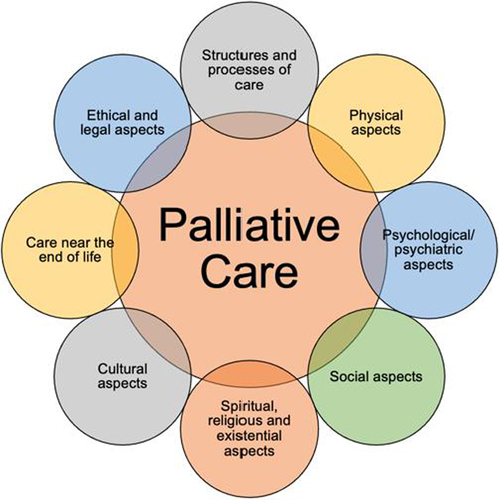Palliative Care: Enhancing the Quality of Life for Cancer Patients
Palliative care is specialized medical care that focuses on providing relief from symptoms, pain, and stress caused by serious illnesses like cancer. The goal of palliative care is to improve the quality of life for patients and their families, regardless of the patient's stage of cancer. This form of care addresses not only the physical but also the emotional, spiritual, and psychological aspects of illness, ensuring holistic support.
At Healtour Solutions, we connect cancer patients with top palliative care providers in India who specialize in managing symptoms, offering comfort, and providing compassionate care during the cancer treatment journey. Our network of hospitals and healthcare professionals focuses on providing personalized palliative care that enhances the overall experience for cancer patients.
Types of Palliative Care Services for Cancer Patients
- Pain Management:
- Definition: Palliative care includes advanced pain management techniques to help control chronic cancer pain. This may involve medication, nerve blocks, and alternative therapies to ensure the patient's comfort.
- Indications: Suitable for patients experiencing moderate to severe pain due to cancer or cancer treatments.
- Symptom Control:
- Definition: In addition to pain, palliative care helps manage other symptoms of cancer, such as nausea, vomiting, fatigue, difficulty breathing, and digestive issues.
- Indications: For patients experiencing any cancer-related symptoms that affect their quality of life.
- Psychosocial Support:
- Definition: Palliative care also offers counseling and emotional support for both the patient and their family to help cope with the emotional and psychological effects of cancer.
- Indications: Essential for patients dealing with the stress, anxiety, and depression that often accompany a cancer diagnosis.
- Hospice Care:
- Definition: Hospice care is a type of palliative care provided when a cancer patient is in the final stages of the illness. The focus is on comfort, pain relief, and emotional support rather than curative treatments.
- Indications: Provided when the patient has a limited life expectancy and is no longer seeking active cancer treatment.
Benefits of Palliative Care for Cancer Patients
- Pain and Symptom Relief: Palliative care offers effective pain management and symptom control, helping patients live more comfortably.
- Improved Quality of Life: Focuses on improving the overall well-being of patients by addressing their physical, emotional, and spiritual needs.
- Emotional and Psychological Support: Offers counseling to patients and families, reducing feelings of anxiety and depression.
- Holistic Care: Provides a comprehensive approach to care, including physical, emotional, and spiritual support, ensuring that the patient’s dignity is maintained.
- Family Support: Helps families cope with caregiving challenges, ensuring they have the resources and support they need.
How Does Palliative Care Work for Cancer Patients?
- Initial Consultation:
Palliative care typically begins with an assessment by a team of specialists, including palliative care doctors, nurses, social workers, and counselors. The team discusses the patient’s symptoms, pain levels, psychological state, and personal wishes.
- Individualized Care Plan:
Based on the consultation, an individualized care plan is developed to address the specific needs of the patient. This plan includes pain management strategies, symptom relief, and emotional or psychological support.
- Treatment and Support:
The palliative care team will implement the care plan, adjusting it as necessary based on the patient’s condition. Medications for pain or other symptoms, therapies, and psychological counseling are provided as part of the treatment.
- Ongoing Monitoring and Adjustment:
The palliative care team regularly monitors the patient’s progress and adjusts the care plan as needed. This ensures that the patient remains as comfortable as possible throughout their cancer journey.
Palliative Care: When is it Needed?
Palliative care is suitable for any cancer patient, regardless of the stage of the illness. It can be introduced at any point during treatment, even alongside curative treatments. It is particularly important when:
- A patient is experiencing severe pain or other symptoms that affect their quality of life.
- The patient’s condition has advanced, and curative treatments are no longer effective.
- The patient or family needs emotional or psychological support to deal with the illness.
- The patient is nearing the end of life and requires comfort care.
Why Choose Healtour Solutions for Palliative Care in India?
- Expert Care Providers: We partner with leading hospitals and healthcare providers in India who specialize in palliative care, ensuring compassionate, expert care for every patient.
- Comprehensive Services: From pain management to emotional support, we offer a full range of palliative care services tailored to the unique needs of cancer patients.
- Affordability: Palliative care in India is more affordable than in many Western countries, making it an excellent option for patients seeking high-quality care at a reasonable cost.
- Personalized Care Plans: Our network ensures that each patient receives a care plan designed specifically for their needs, ensuring optimal comfort and quality of life.
- Global Patient Support: We assist international patients in accessing the best palliative care services in India, providing seamless travel and accommodation arrangements for a stress-free experience.
Step-by-Step Guide to Palliative Care for Cancer Patients
- Initial Assessment:
The patient undergoes a comprehensive evaluation by the palliative care team, which includes doctors, nurses, and mental health professionals.
- Care Plan Development:
The palliative care team develops an individualized care plan based on the patient’s medical history, symptoms, and personal preferences.
- Implementation of Care:
The care team implements the pain management, symptom control, and emotional support plan. Regular monitoring ensures the care remains effective.
- Ongoing Support and Adjustments:
Regular follow-up visits ensure that the patient’s needs are continuously met and that the care plan is adjusted as the patient’s condition evolves.
- End-of-Life Care:
For patients in the final stages of cancer, hospice care is provided, focusing on comfort, dignity, and emotional support for both the patient and their family.
Side Effects of Palliative Care
Palliative care aims to alleviate symptoms, so side effects are minimal, but some may include:
- Medication Side Effects: Pain medications, especially opioids, may cause drowsiness, constipation, or nausea. These are usually managed with additional medications.
- Psychological Impact: While the focus is on comfort, patients and families may still experience emotional distress, which is addressed through counseling and support.
Contact Us for Palliative Care Services in India
If you or a loved one is seeking compassionate, comprehensive palliative care in India, Healtour Solutions can help you connect with the best hospitals and care providers. We are here to ensure that every cancer patient receives the highest quality of life possible during their treatment journey. Reach out today for more information on palliative care services in India.
FAQs About Palliative Care for Cancer Patients
1. What is palliative care?
Palliative care is specialized medical care that focuses on providing relief from symptoms, pain, and stress caused by serious illnesses like cancer, aiming to improve the quality of life for both the patient and their family.
2. When should palliative care start for cancer patients?
Palliative care can begin at any stage of cancer treatment, from diagnosis to end-of-life care, depending on the patient’s needs.
3. Is palliative care the same as hospice care?
While hospice care is a type of palliative care provided at the end of life, palliative care can begin earlier and be used alongside curative treatments.
4. How is pain managed in palliative care?
Pain is managed with medications such as opioids, and non-medical therapies such as nerve blocks or physical therapy are also used for relief.
5. Does palliative care cure cancer?
Palliative care does not cure cancer, but it focuses on alleviating symptoms, managing pain, and improving quality of life.
6. Can palliative care be provided at home?
Yes, palliative care can be provided at home by trained caregivers, ensuring comfort and peace during the treatment journey.
7. How is palliative care different from regular cancer treatment?
Palliative care focuses on symptom management, pain relief, and overall comfort rather than treating the cancer itself.
8. Can palliative care be used alongside other treatments?
Yes, palliative care can be used in conjunction with curative treatments, offering patients relief from symptoms while undergoing cancer treatment.
9. How much does palliative care cost in India?
The cost of palliative care in India can range from $1,000 to $4,000 per month, depending on the level of care required.
10. How do I start palliative care in India?
Healtour Solutions can assist you in connecting with the best palliative care providers in India, ensuring that you receive the support you need.




